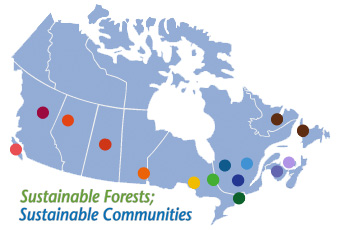
Community Transition & Development
There are many issues facing Canadian forest-based communities. One is the closure of timber mills, often the main employer. This has significant social and economic impacts. Some communities are able to adapt better to these changes than others.
The Canadian Model Forest Network is helping communities understand their ability to overcome obstacles. Many are dealing with challenges today and others are planning for the future. To assist, we have developed a workbook. This will help local leaders become more aware of their situation. It will also assist them in choosing the right assessment tool. In addition, the guide shows the best methods to address current and future problems. After going through the workbook, local leaders will have an insight to their community's current status, as well as options that may reduce their weaknesses.
This workbook is applicable to forest-based communities, as well as other natural resource-dependent areas. Together, using these tools, we can work to maintain our rural communities now and into the future.
Aboriginal Partnerships
The CMFN has valued partnerships with Aboriginal groups across the country, who bring a unique knowledge of the forest. This has been developed over centuries of close contact with the land. These groups have both traditional and contemporary forest experiences. Thus, Aboriginal peoples are well positioned to contribute to today's sustainable forest and natural resource management practices. This will benefit their communities as well as all Canadians.

